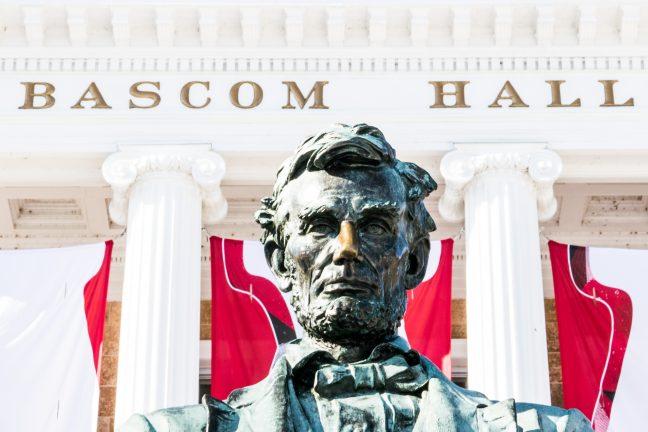University of Wisconsin staff have developed a new service to assist faculty researchers in maintaining compliance with federally mandated reporting guidelines and public access requirements when publishing their work.
The service, called BuckySubmit, was developed in May through the efforts of a unit headed by UW public access compliance specialist Ryan Schryver. The goal of BuckySubmit is to make researchers’ lives easier through easing some of the burdens of UW researchers in making sure they comply with certain guidelines when reporting their work to federal agencies.
With the advent of this new tool, researchers can now leave their completed, federally funded research manuscripts at Schryver’s office in Ebling Library. From there, Schryver and his team review the manuscript and submit it for the researcher, thus ensuring compliance with the federal agency or agencies which funded it.
Researchers at UW or any institution who receive funding from federal agencies must follow “public access” guidelines. These rules are enforced with the intention of making federally funded research more accessible to the public.
Schryver said these guidelines have been in place since 2008, when the National Institutes of Health first started mandating that research be made more publicly accessible.
Astrobotany gets a new look: New research generates fashion line
In 2013, Schryver said these guidelines were greatly expanded to other federal agencies. The Obama administration’s White House Office of Science and Technology Policy mandated that every federal agency which spends more than $100 million on research and development must also enforce public access guidelines on the research it funds.
As this policy expanded, however, it did not become centralized under a single agency or database. Each individual federal agency maintains their own system for submitting research, which Schryver can become time consuming and confusing for researchers when they submit their manuscripts.
“The public access requirement is kind of a weird beast in that it’s not centralized,” Schryver said. “Almost every agency has their own repository for public access, and almost every agency has their own pathway as far as submitting a manuscript.”
New research at UW indicates more ways to understand diseases in nervous system
The real benefit of this new tool, Schryver said, is that it allows faculty to devote their limited time and energy solely on their research, without having to worry about whether they are in compliance with public access guidelines.
Researchers who fail to report or publish their research in compliance with federal guidelines could see their funding delayed or even forfeited. Schryver said it is understandable for them to worry about whether they are in compliance with these rules.
“The whole point is that we want researchers to focus on what’s important — the research,” Schryver said. “If we can assist them by taking away one thing off their plate, we’re going to try and do that.”
The new tool will undoubtedly be used by many researchers on the UW campus, as federal agencies spent more than $589 million on research at UW alone in 2016. This number was more than $250 million larger than all non-federal funding sources combined for that year.
Natasha Kassulke, a spokeswoman for the Office of the UW Vice Chancellor for Research and Graduate Education, said the federal government and research universities like UW have a “long-standing and successful” partnership.
Million-dollar initiative looks to help revolutionize microbiome research at UW
“The federal government relies on universities to conduct research in the national interest,” Kassulke said. “This includes research aimed at meeting specific national goals such as health and welfare, economic growth and national defense.”
Kassulke said more than half of federal funding in 2016 — $325.5 million — came from the U.S. Dept. of Health and Human Services. Other federal agencies which awarded substantial amounts for research and development at UW included the National Science Foundation and the U.S. Department of Energy.
These three agencies comprised 81 percent of federal spending on research and development on the UW campus in 2016. Along with the National Aeronautic and Space Administration, the remaining 19 percent came from the U.S. Depts. of Defense, Education, Commerce and Agriculture.
These funds landed in various colleges and institutions at UW, but 33 percent of all federal funds in 2016 went to the School of Medicine and Public Health, the largest recipient by 15 percent.
EPA grant freeze leaves future of research, innovation at UW uncertain
Other recipients of large portions of federal funding in 2016 included the College of Engineering (18 percent), the College of Letters & Science (18 percent) and the Graduate School (17 percent). With the School of Medicine and Public Health, these four colleges received 86 percent of all federal funds for research and development at UW in 2016.
Kassulke said there are many reasons why a particular program might receive more funding than others, and much of the determination occurs in the application process, where researchers outline their proposals to federal agencies.
While UW’s status as a large research institution means it receives generous levels of federal funding relative to other institutions, the university has recently received less funding than in years past.
While the $589.7 million awarded in 2016 was the highest level of federal funding seen since 2013, this amount was still more than $100 million less than the university received in 2010 and came after a series of years in which funding continuously decreased. Kassulke attributed these smaller funding levels to federal budget cuts.
Despite these expenditure cuts, a survey conducted by the National Science Foundation ranked UW sixth in the nation among research institutions for the second year in a row — a ranking which UW vice chancellor for research and development Marsha Mailick said is a good sign for the university after years of cuts to research expenditures.
EPA grant freeze leaves future of research, innovation at UW uncertain
These cuts, however, could possibly increase in 2018 and onward, as President Donald Trump’s proposed budget for that year includes deep cuts to federally funded research. In a statement, UW Chancellor Rebecca Blank said these cuts would harm numerous programs at UW which are “vital to the interests of the state.”
“If enacted by Congress, such cuts would significantly impact the nation’s public research institutions and the students who attend our institutions, as well as the overall competitiveness of our country,” Blank said.
Chancellor Blank said she and the university administration will be working with Wisconsin’s Congressional delegation and others in the nation’s capital to advocate for UW’s interests in light of Trump’s proposed budget.
While the future trajectory of federally funded research at UW and other institutions like it remains to be seen, research at UW continues to make headlines for its discoveries.
Through the use of BuckySubmit, Schryver and the UW administration hope the university’s researchers will maintain current funding levels and continue to publish acclaimed research.

















